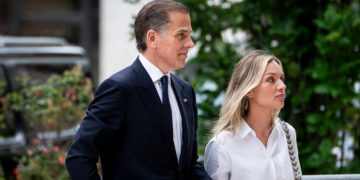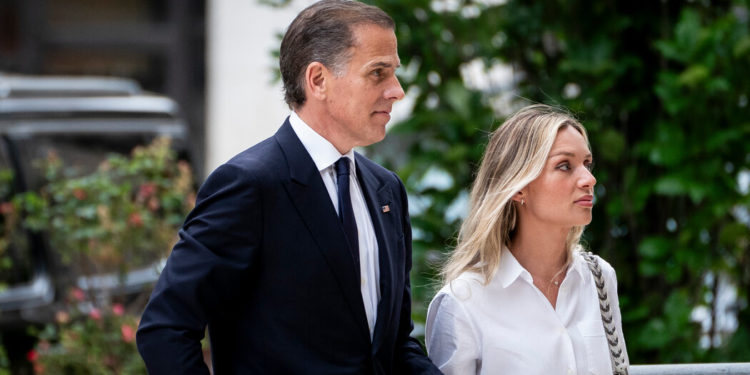Prosecutors signaled in a court filing on Wednesday that they intended to mount an aggressive strategy in Hunter Biden’s tax trial in California, saying they would show how foreign interests paid him to influence the U.S. government while his father was vice president.
The special counsel in the case, David C. Weiss, has wrangled for weeks with Mr. Biden’s lawyers over what evidence can be introduced when he is to be tried in September on charges of evading taxes on millions in income from foreign businesses. Already, Mr. Weiss has overseen Mr. Biden’s conviction tied to the purchase of a gun in Delaware in 2018.
Mr. Biden’s team had moved to disqualify evidence about his lucrative foreign business activities and lifestyle from a time when he was addicted to crack cocaine and alcohol. Mr. Weiss’s deputies rejected those arguments on Wednesday, in a preview of what promises to be a bare-knuckled courtroom strategy.
Prosecutors stopped short of accusing Mr. Biden of violating foreign lobbying laws, which are not among the charges for which he faces trial. While they intend to introduce evidence that Mr. Biden and his business partners contacted government officials, they said they did not plan to accuse him of having “improperly coordinated with the Obama administration.”
Instead, they plan to cite evidence related to his foreign business dealings to prove how he willfully engaged in a scheme to obtain vast amounts of cash without paying taxes.
To that end, prosecutors said they would introduce testimony from an American business associate of Mr. Biden’s to detail a lucrative arrangement with a Romanian real estate magnate who faced corruption charges at home.
The magnate, who is identified in the filing only by his initials but is known to be Gabriel Popoviciu, hoped that Mr. Biden and his associates could persuade U.S. officials to intervene with the Romanian authorities to drop a criminal investigation into a land deal with the government.
Mr. Popoviciu signed a $3 million agreement with Mr. Biden’s associate, who then passed a third of the money to Mr. Biden, according to prosecutors, who described the arrangement as an “attempt to influence U.S. government agencies.”
But it was configured as a property management agreement to avoid “political ramifications” for his father that could have arisen had Mr. Biden disclosed the work under the Foreign Agents Registration Act, or FARA, wrote Derek Hines, a top deputy to Mr. Weiss.
In the filing, prosecutors indicated that they intended to introduce evidence related to Mr. Biden’s business dealings with not only Mr. Popoviciu, but also the Ukrainian gas company Burisma and the Chinese energy conglomerate CEFC China Energy.
It was money for nothing, prosecutors said. Mr. Biden “performed almost no work in exchange for the millions of dollars he received from these entities,” they wrote.
Mr. Biden’s lawyers did not respond to a request for comment.
A message sent to an account known to have been used by Mr. Popoviciu did not immediately yield a response. His seven-year prison sentence for corruption was vacated by a Romanian court last year.
Mr. Popoviciu had retained a number of politically connected Americans to try to defuse the case.
Mr. Biden’s involvement could create complications as he seeks to avoid a second criminal conviction and possible prison time. The court documents suggest he could be in for another wrenching public reckoning if he does not reach a plea deal — after a shattering seven-day trial in June ended with his conviction on three felony counts for lying on a federal firearms application.
Mr. Weiss and Mr. Biden agreed to a plea deal in early 2023 that would have spared him any prison time. But it abruptly imploded at a hearing that July, when Judge Maryellen Noreika of the Federal District Court in Wilmington, Del., sharply questioned elements of the deal, saying she had no intention of being “a rubber stamp.”
At that hearing, Leo Wise, another deputy to Mr. Weiss, left open the possibility that Mr. Biden could be prosecuted for FARA violations.
The trial had loomed as a potential minefield in the presidential campaign, but it lost some of its potency when President Biden dropped his bid for re-election.
It could nonetheless prove embarrassing for Democrats, and provide a modest rallying point for Republicans who spent years spotlighting the younger Mr. Biden’s foreign business activities in a bid to damage his father. They have signaled that they plan to try to saddle Vice President Kamala Harris, the Democratic nominee, with the Biden administration’s baggage.
Last December, a federal grand jury in Los Angeles charged Mr. Biden, who has been sober for several years, in the tax case.
Mr. Biden pleaded not guilty to three counts each of evasion of a tax assessment, failure to file and pay taxes, and filing a false or fraudulent tax return — documented in a withering 56-page indictment that read like a play-by-play of personal indulgence and financial profligacy.
Prosecutors said that he “subverted the payroll and tax withholding process of his own company,” Owasco PC, by withdrawing millions from the coffers that he used to subsidize “an extravagant lifestyle rather than paying his tax bills.”
In the indictment, Mr. Weiss called out Mr. Biden for failing to pay child support and for his reliance on associates, including the Hollywood lawyer Kevin Morris, to pay his way.
The Biden legal team tried to throw out some of that evidence detailing his spending and partying, but the government is asking Judge Mark C. Scarsi, who is presiding in the case, to allow it to be introduced.
The post Prosecutors Preview Aggressive Strategy in Hunter Biden’s Tax Case appeared first on New York Times.



















